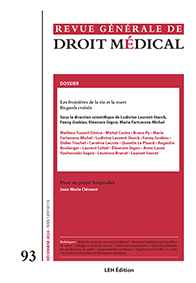0
Panier
0 €

Provoquer la mort : qui ? quand ? comment ?
Citer cet ouvrage :
Boulanger Augustin, Provoquer la mort : qui ? quand ? comment ? ,RGDM, n°93, 2024, p.89-95
Exporter vers RIS
Télécharge un fichier pour utilisation dans EasyBib, Mendeley, Zotero, etc.
EXPORTER vers RIS
Télécharge un fichier pour utilisation dans EasyBib, Mendeley, Zotero, etc.
EXPORTER vers RIS


